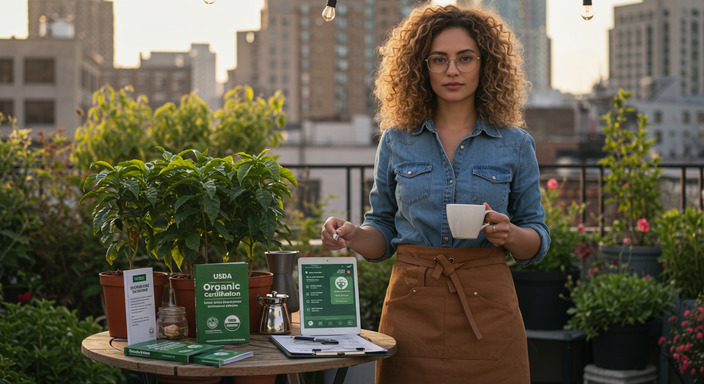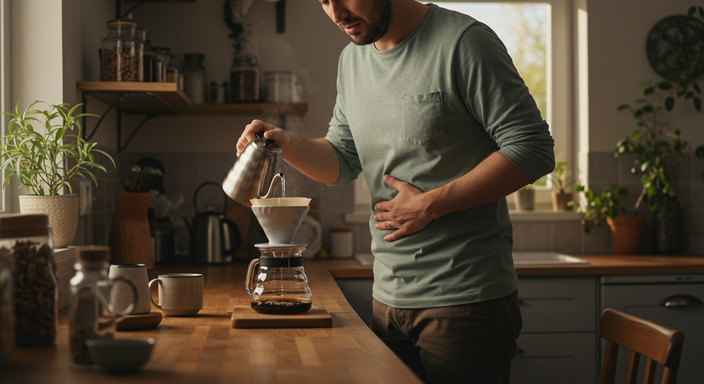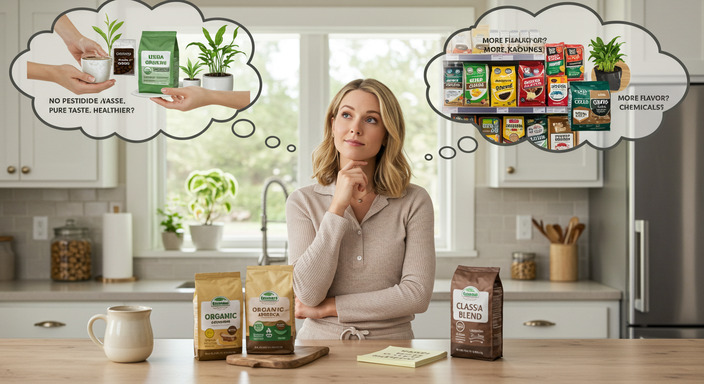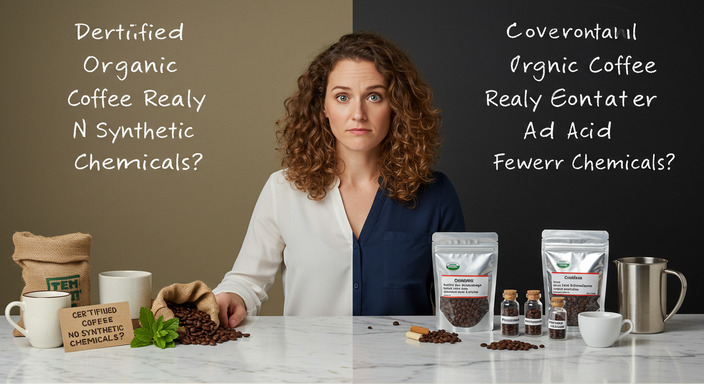
What Defines Organic Coffee in the U.S.? A Clear Guide

Table of Contents
ToggleIntroduction to Organic Coffee
What is Organic Coffee?
Organic coffee is more than just a beverage—it’s a commitment to sustainability and health. Unlike conventional coffee, organic coffee is grown without the use of synthetic pesticides, herbicides, or chemical fertilizers. Instead, it relies on natural farming practices that nurture the soil, protect ecosystems, and promote biodiversity. To be certified organic in the U.S., coffee must meet strict standards set by the USDA, ensuring it’s free from harmful chemicals and produced in an environmentally responsible way.
Why It Matters for Health
Choosing organic coffee isn’t just about taste—it’s about your well-being. Conventional coffee farming often involves chemicals that can leave residues on the beans. By opting for organic, you reduce your exposure to these potentially harmful substances. Additionally, organic coffee is often richer in antioxidants, which can support overall health. For those who are health-conscious, organic coffee offers a cleaner, purer way to enjoy your daily cup.
Why It Matters for the Environment
Organic coffee farming plays a vital role in protecting our planet. Traditional coffee farming can lead to deforestation, soil degradation, and water pollution. In contrast, organic practices focus on:
- Soil health: Using compost and natural fertilizers to enrich the soil.
- Biodiversity: Preserving natural habitats for wildlife.
- Water conservation: Reducing chemical runoff to protect water sources.
By supporting organic coffee, you’re contributing to a healthier planet and a more sustainable future.
U.S. Standards for Organic Coffee
What is USDA Organic Certification?
When you see the USDA Organic label on a bag of coffee, it means the product has met strict standards set by the United States Department of Agriculture. To earn this certification, coffee must be grown, processed, and packaged without the use of synthetic pesticides, herbicides, or chemical fertilizers. Additionally, organic coffee farms must follow sustainable farming practices that protect the environment, conserve water, and promote biodiversity. This certification ensures that every step of the coffee’s journey—from bean to cup—aligns with eco-conscious and health-focused principles.
Key Requirements for Organic Coffee
To qualify as organic, coffee must meet several criteria:
- No synthetic chemicals: Farmers must avoid using synthetic pesticides, herbicides, and fertilizers, opting instead for natural alternatives like compost and organic pest control methods.
- Sustainable farming: Practices such as crop rotation, shade-growing, and soil conservation are essential to maintain the health of the land and surrounding ecosystems.
- Third-party verification: Independent certifiers inspect farms and processing facilities to ensure compliance with USDA organic standards.
Organic vs. Conventional Coffee: What’s the Difference?
Understanding the distinction between organic and conventional coffee can help you make more informed choices. Here’s a quick comparison:
| Aspect | Organic Coffee | Conventional Coffee |
|---|---|---|
| Chemical Use | No synthetic pesticides or fertilizers | Often treated with synthetic chemicals |
| Farming Practices | Sustainable, eco-friendly methods | May involve deforestation and soil degradation |
| Health Impact | Reduced exposure to harmful residues | Potential exposure to chemical residues |
| Environmental Impact | Supports biodiversity and soil health | Can harm ecosystems and deplete resources |
Choosing organic coffee isn’t just about what’s in your cup—it’s about supporting a system that values health, sustainability, and ethical practices. By opting for USDA-certified organic coffee, you’re making a choice that benefits both your well-being and the planet.
Benefits of Organic Coffee
Health Advantages for Consumers
When you choose organic coffee, you’re not just sipping a delicious beverage—you’re making a health-conscious decision. Organic coffee is grown without synthetic pesticides, herbicides, or chemical fertilizers, which means fewer toxins make their way into your cup. This reduces your exposure to potentially harmful substances that can accumulate in your body over time.
Additionally, organic coffee is often richer in certain nutrients, such as antioxidants, which help fight inflammation and support overall health. For those with sensitivities, organic coffee may also be gentler on the stomach, as it’s typically free from chemical residues that can irritate digestion.
Environmental Benefits
Opting for organic coffee is a planet-friendly choice. Organic farming practices prioritize sustainability by avoiding synthetic chemicals that can harm soil, water, and ecosystems. Instead, farmers use natural methods like composting, crop rotation, and shade-growing, which help maintain soil health and promote biodiversity.
Shade-grown organic coffee, in particular, supports thriving ecosystems by preserving forest habitats for birds and other wildlife. This approach also helps combat deforestation, making it a win for the environment.
- Reduces soil and water contamination
- Promotes biodiversity and wildlife conservation
- Supports sustainable farming practices
Ethical Benefits
Organic coffee is often associated with fair trade and ethical sourcing practices. This means that farmers are paid fair wages and work in safe conditions, ensuring that your coffee choice supports social responsibility. By purchasing organic coffee, you’re contributing to the well-being of farming communities and helping to create a more equitable global economy.
Many organic coffee brands are also committed to transparency, allowing you to trace the journey of your coffee from farm to cup. This connection fosters a greater appreciation for the people and processes behind your daily brew.
“Choosing organic coffee isn’t just about taste—it’s about nurturing health, protecting the planet, and supporting fairness in farming communities.”
How to Identify Organic Coffee
Reading Labels and Certifications
When searching for organic coffee, the first step is to read the labels carefully. Look for official certifications, such as the USDA Organic seal, which ensures the coffee meets strict federal guidelines. This seal guarantees that the coffee is grown without synthetic pesticides, herbicides, or fertilizers, and is processed using sustainable methods. Additionally, certifications like Fair Trade or Rainforest Alliance can indicate ethical sourcing and environmentally friendly practices. Here’s a quick guide to what to look for:
- USDA Organic: Ensures the coffee is 95% or more organic.
- Fair Trade: Guarantees fair wages and ethical treatment of farmers.
- Rainforest Alliance: Promotes sustainable farming and biodiversity.
Always check the ingredient list—organic coffee should contain no artificial additives or preservatives.
Trusted Brands and Sources
When in doubt, turn to trusted brands that have a proven track record of producing high-quality organic coffee. Researching brands that prioritize sustainability and transparency can save time and ensure you’re making a responsible choice. Some well-known brands include Equal Exchange, Javavino, and Coastal Coffee Roasters. These companies often share their sourcing practices and commitment to ethical standards on their websites. Additionally, consider purchasing from local roasters or specialty coffee shops that focus on organic and small-batch products. Supporting these businesses not only ensures quality but also encourages sustainable practices within the coffee industry.
The Journey of Organic Coffee
From Farm to Cup: The Production Process
The journey of organic coffee begins on meticulously managed farms that prioritize sustainability and environmental health. Unlike conventional coffee farming, organic coffee is grown without synthetic pesticides, herbicides, or fertilizers. Instead, farmers rely on natural methods such as composting, crop rotation, and shade-grown techniques to nurture the plants. This not only preserves the soil’s fertility but also protects the surrounding ecosystem.
Once the coffee cherries are ripe, they are handpicked to ensure only the best quality beans are selected. The beans are then processed using eco-friendly methods, such as water-efficient washing or sun drying. This careful attention to detail at every stage ensures that the coffee retains its natural flavor and health benefits while minimizing its environmental impact.
- Shade-grown coffee promotes biodiversity and protects wildlife habitats.
- Handpicking ensures high-quality beans and supports local labor.
- Eco-friendly processing reduces water and energy consumption.
Supporting Fair Trade and Small Farmers
Choosing organic coffee often goes hand in hand with supporting fair trade practices. Fair trade ensures that farmers receive fair compensation for their hard work, enabling them to invest in their communities and improve their livelihoods. This is especially important for small-scale farmers, who often face challenges in competing with larger commercial operations.
By purchasing organic coffee, consumers contribute to a system that values ethical sourcing and transparency. Fair trade certifications guarantee that the coffee is produced under fair labor conditions and that farmers are paid a living wage. This not only improves the lives of farmers and their families but also fosters a more equitable global coffee industry.
“Fair trade coffee ensures that every sip you take supports a better future for farmers and the planet.”
Common Myths About Organic Coffee
Debunking Misconceptions
When it comes to organic coffee, there are several misconceptions that can cloud understanding. Let’s clear the air:
- Myth: Organic coffee tastes different. Many people assume organic coffee has a distinct flavor, but the truth is, taste depends on factors like roast level, brewing method, and bean origin—not certification.
- Myth: Organic coffee is too expensive. While it may cost a bit more, the price reflects the sustainable farming practices and fair wages for farmers. Think of it as an investment in both your health and the planet.
- Myth: All organic coffee is shade-grown. While many organic farms use shade-growing methods, not all do. Shade-grown is a separate practice, though it often overlaps with organic farming for its environmental benefits.
Organic vs. Specialty Coffee Explained
It’s easy to confuse organic coffee with specialty coffee, but they are not the same. Here’s how they differ:
| Organic Coffee | Specialty Coffee |
|---|---|
| Certified by USDA or other bodies to meet organic standards. | Graded by the Specialty Coffee Association (SCA) based on quality. |
| Grown without synthetic pesticides, herbicides, or fertilizers. | Focuses on flavor, aroma, and bean quality, regardless of farming practices. |
| Emphasizes sustainability and environmental health. | May or may not follow sustainable practices. |
Key takeaway: Organic coffee is about how it’s grown, while specialty coffee is about how it tastes. The two can overlap, but they address different priorities.
Making the Switch to Organic Coffee
Transitioning to organic coffee is more than just a change in your morning routine—it’s a step toward a healthier lifestyle and a more sustainable planet. Whether you’re a coffee enthusiast or a casual drinker, making the switch can feel overwhelming at first. But with a few simple tips, you’ll find it’s easier than you think—and well worth the investment.
Tips for Transitioning to Organic Coffee
Switching to organic coffee doesn’t have to be a drastic change. Here are some practical tips to help you make the shift seamlessly:
- Start small: Begin by replacing one cup of your regular coffee with an organic option. Gradually increase as you get used to the taste and quality.
- Read labels carefully: Look for certifications like USDA Organic or Fair Trade to ensure you’re buying genuine organic coffee.
- Explore brands: Try different organic coffee brands to find one that suits your taste preferences. Many companies offer sample packs to help you decide.
- Support local roasters: Check out local coffee shops or roasters that specialize in organic beans. They often provide fresher options and support sustainable practices.
- Invest in quality: While organic coffee may cost a bit more, the superior taste and health benefits make it a worthwhile investment.
Why It’s Worth the Investment
Choosing organic coffee isn’t just about taste—it’s about making a positive impact on your health, the environment, and the lives of coffee farmers. Here’s why it’s worth every penny:
- Healthier choice: Organic coffee is free from synthetic pesticides and chemicals, reducing your exposure to harmful substances.
- Better for the planet: Organic farming practices promote soil health, conserve water, and reduce pollution, helping to protect ecosystems.
- Ethical sourcing: Many organic coffee brands prioritize fair wages and safe working conditions for farmers, ensuring a more equitable supply chain.
- Superior flavor: Organic coffee is often grown in nutrient-rich soil, resulting in a richer, more complex flavor profile.
FAQ: Making the Switch to Organic Coffee
Is organic coffee more expensive? Yes, organic coffee typically costs more due to the labor-intensive farming practices and certifications required. However, the benefits to your health and the environment make it a worthwhile investment. Does organic coffee taste different? Many people find that organic coffee has a cleaner, more vibrant taste because it’s grown without synthetic chemicals and in healthier soil. Where can I buy organic coffee? You can find organic coffee at most grocery stores, specialty coffee shops, and online retailers. Look for certifications to ensure authenticity.
Making the switch to organic coffee is a small change that can have a big impact. By choosing organic, you’re not only enhancing your own well-being but also supporting a more sustainable and ethical coffee industry. So, take that first sip—and savor the difference.
is a writer and editor at Coffee With Finance, blending her love for coffee, personal finance, and visual storytelling. She crafts engaging articles, curates site images, and shares brewing tips, bean origins, and practical money advice. Anna believes that managing finances, like making great coffee, should be intentional and rewarding — bringing clarity, warmth, and beauty to every story she tells.




























Post Comment